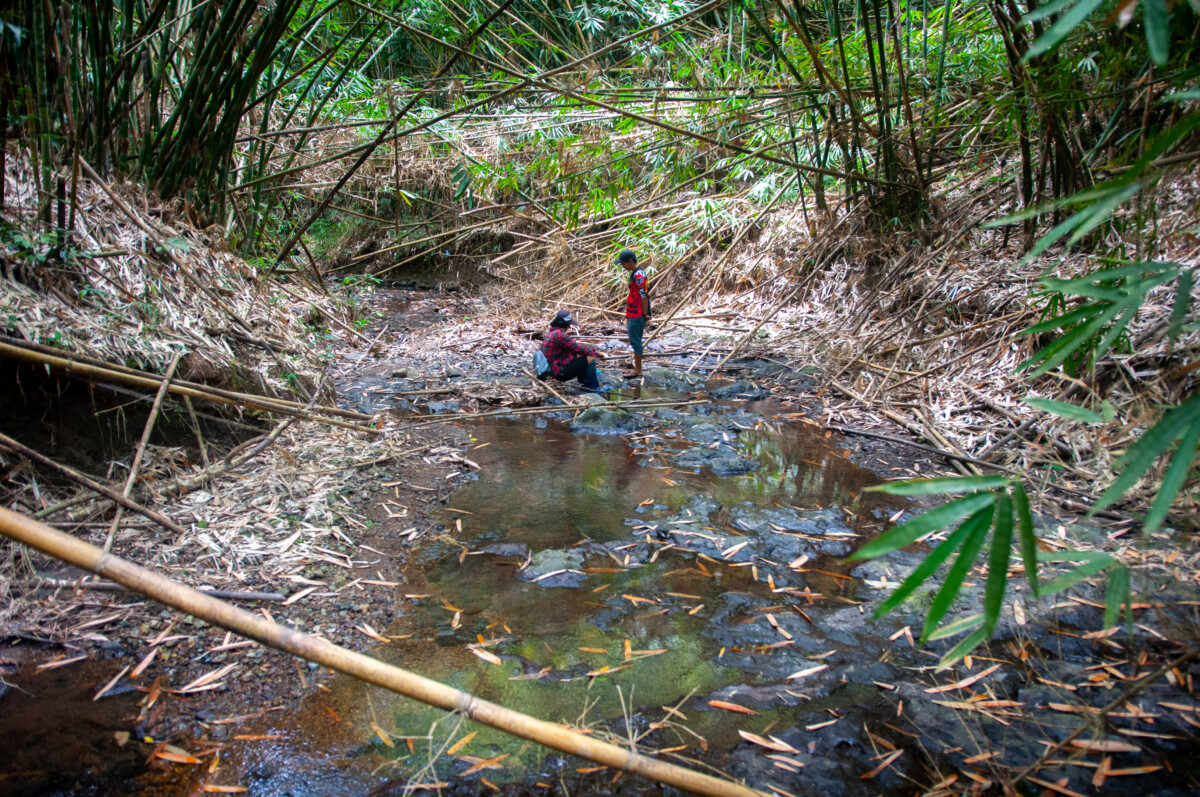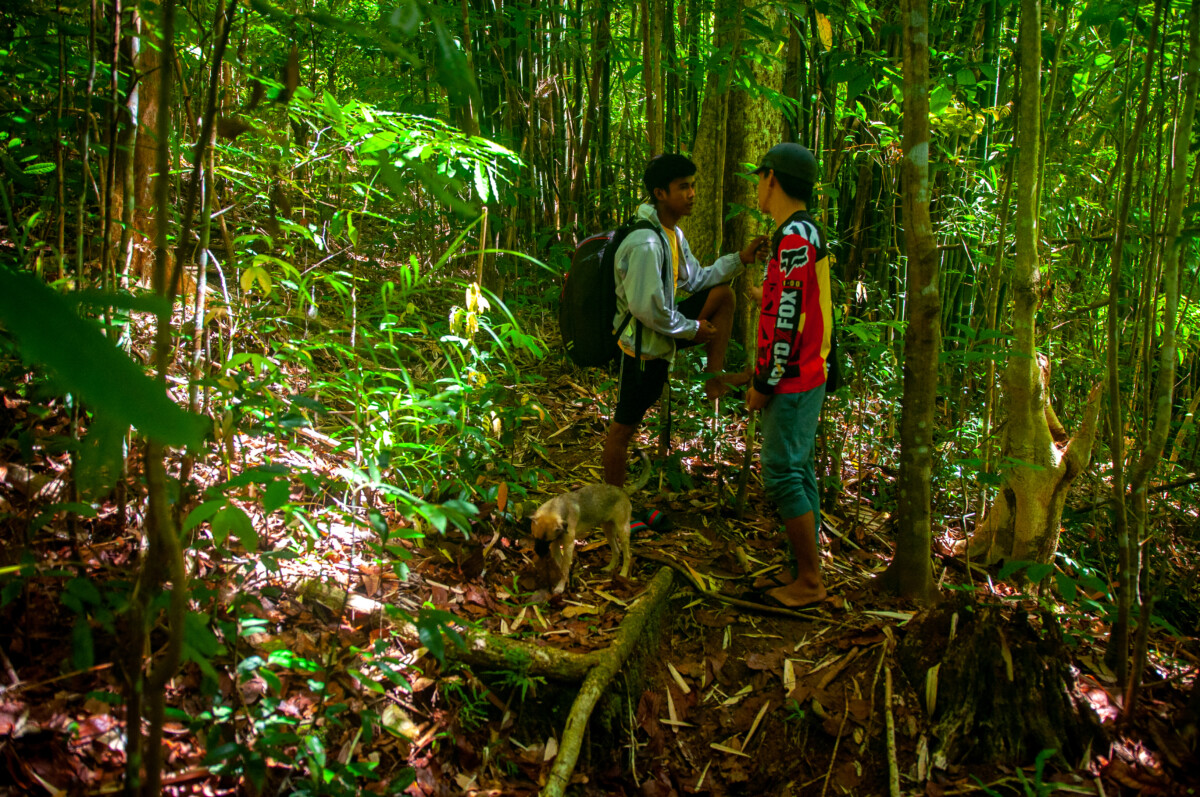Indigenous Communities at the Frontlines of Environmental Conservation

The Ipo Watershed is monitored and guarded by its resident forest rangers from the Dumagat tribe. Photo: © WWF-Philippines
Everyone on Earth has a role to play in protecting nature but it is always the local community that has the greatest stake and also the biggest potential impact in their immediate environment. Local communities play a big role in environmental conservation and this is evident in the Ipo Watershed in Bulacan where the Dumagat tribe are the frontliners.
The Ipo Watershed has changed so much over the years according to Dumagat Tribal Mayor Manny Cruz at the Ipo Watershed in Norzagaray, Bulacan. He and other Dumagat tribal members work as “bantay gubat” or forest rangers protecting the forests and wildlife of the Ipo Watershed.
“Ok pa noong mga panahon na talagang ang yamang gubat, ang yamang tubig ay talagang sagana sa lugar na ito,” (It was ok back when the forests and water resources were very abundant here) said Cruz. He looked to the distant mountain tops with wrinkled eyebrows and eyes squinted against the sun then said that back in the early years, there were barely any people aside from his tribe at the watershed.
Cruz and the Dumagat tribe are community partners that help in the management of the Ipo Watershed which is important for the water security of Metro Manila and other adjacent provinces. More than 90% of the freshwater needs of the country’s capital, home to millions of Filipinos, comes from the Ipo Watershed.
Cruz states that “ang kailangan natin dito ay maging continued yung pagtatanim. Yung binabantayan natin ay talagang magiging maayos ‘yan,” (we need continued reforestation. What we guard will surely be restored).
Community partners are important for science-based conservation initiatives because they have the potential to be the best stewards of the watershed as they consider it their home.
The Dumagat tribe have intimately witnessed the many changes at the Ipo Watershed throughout the years including the years of rampant logging and exploitation that have left scars on the forest.
After multiple conservation projects, the forest cover of the watershed has bounced back. Cruz said that “madalang ka na lang makakakita ng kalbo, (you will rarely see denuded areas of the forests now).

Forest rangers or bantay gubat, in Filipino, patrol the forests with their dog. Photo: © WWF-Philippines
While tree planting and forest protection are the main activities carried out in the project, the goal is to ensure the water security and supply of Metro Manila. Watersheds act as a valuable sponge that absorbs rainwater in the soil with the help of the deep roots of trees. During the dry season, water seeps back into the river to keep it flowing. If there are no trees with their deep roots, rain water will just flow above the soil and go straight into the river then towards the sea instead of being stored for a later time.
““Hingi kayo nang hingi ng tubig sa kalikasan, pero wala naman kayo ginagawa para madagdagan yung supply,” (You keep asking for water from nature but don’t do enough to add to the water supply,) Baldomero Diesta, the Barangay Indigenous People’s Mandatory Representative (IPMR) said in a separate interview.
As IPMR, Diesta empowers the Dumagat tribe through representation in the local government and bridges information between barangay officials and the members of the tribe. He led the vaccination efforts for the community during the height of the pandemic.
Diesta emphasizes that the regulation of forest activities and reforestation efforts must be prioritized so that the water supply of Metro Manila will not be compromised.
A personal stake and ownership
Cruz has firmly believed that the forest rangers should be local residents. He said that “May malasakit ka dahil nagbabantay ka” (you have concern for the forests so you safeguard it).
He states that more than having a salary, personal stake and ownership is what motivates the forest rangers in their conservation roles. “’Di ba may ganoong ugali ang mga Pilipino na ‘hindi naman sa akin ‘yan, bahala na sila dyan’ so sa amin doble ang gagawin namin dahil para sa gobyerno at para na rin sa amin,” (Filipinos have an attitude of ‘it’s none of my business, let them deal with it’ so us locals we do double the effort because it’s both for the government and for ourselves, too).
With the watershed spanning over 7,000 hectares, the Dumagat are the frontliners of the forests they call home against intruders and varying forms of illegal activities that threaten the forests. For the Dumagat, protecting the Ipo Watershed is personal.
Inclusive conservation
Indigenous peoples like the Dumagat tribe are often discriminated against and their vital role as stewards of nature are now being recognized. The indigenous knowledge that helps protect their ancestral land is important to be included in conservation efforts.
The participation of IPs in environmental management creates a path towards a sustainable and inclusive conservation effort. Securing indigenous peoples' land rights is both a culturally respectful and a low-cost strategy to combat global deforestation and climate change. Supporting inclusive conservation also means providing IPs with the resources they need to ensure the livelihood of their communities. Many indigenous peoples and small communities cannot imagine their lives without nature, and thus have a great interest in resource sustainability.
Their strong links to the natural environment and indigenous knowledge are important in the mobilization of Forests for Water. The Dumagat are invested in fighting climate change in order to safeguard their resources and ancestral land. When IPs thrive, their surrounding nature also thrives. Traditional knowledge on environmental preservation and conservation helps our collective battle against climate change.
“Ginawa natin ‘tong proyekto na ‘to mula sa mga mungkahi nila na ang tutok nga ay mapangalagaan yung kagubatan ng Ipo Watershed,” (we created this Forests for Water project based on the local Dumagat recommendations with the focus on rehabilitating the forests of the Ipo Watershed) said Paolo Pagaduan, Project Manager of WWF-Philippines’ Forests for Water program.
The Dumagat tribe has an important function in conservation. Public recognition of their hard work and the lived realities they have experienced in protecting the Ipo Watershed is part of a commitment towards an equitable and sustainable future for all.
About WWF:
WWF is one of the world’s largest and most respected independent conservation organizations, with over 5 million supporters and a global network active in over 100 countries. WWF's mission is to stop the degradation of the Earth's natural environment and to build a future in which humans live in harmony with nature, by conserving the world's biological diversity, ensuring that the use of renewable natural resources is sustainable, and promoting the reduction of pollution and wasteful consumption.
WWF-Philippines has been successfully implementing various conservation projects to help protect some of the most biologically-significant ecosystems in Asia since its establishment as the 26th national organization of the WWF network in 1997.
